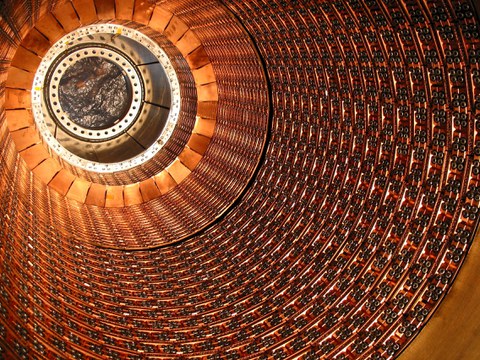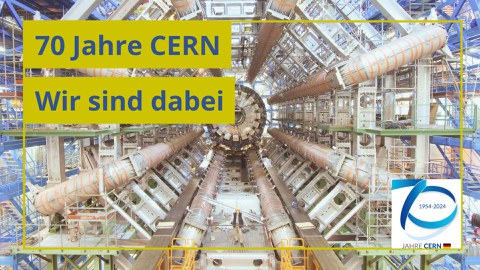09.09.2024
70 Jahre Forschungszentrum CERN: TU Dresden feiert mit und beleuchtet die Forschungsleistung Dresdner Wissenschaftler:innen
Seit 70 Jahren wird am europäischen Forschungszentrum für Teilchenphysik, dem CERN in Genf, Spitzenforschung betrieben: Mit riesigen Beschleunigern und Detektoren erforschen Wissenschaftler:innen dort die kleinsten Bestandteile des Universums. Die TU Dresden ist an diesen Forschungsarbeiten beteiligt. Das Institut für Kern- und Teilchenphysik an der TU Dresden feiert den 70. CERN-Geburtstag mit zwei Veranstaltungen im September.

Das Flüssig-Argon-Kalorimeter ist das Herzstück des ATLAS-Experiments und wurde unter Mitwirkung der TUD gebaut. Es misst geladene und neutrale Teilchen in einem breiten Energiebereich.
Beim Vortrag 70 Jahre europäische Teilchenphysik am CERN: Auf der Suche nach der Weltformel berichten Dr. Philip Sommer und Prof. Arno Straessner, wie am CERN geforscht wird, welche wegweisenden Entdeckungen dort bislang erfolgten und welchen Beitrag Dresdner Wissenschaftler:innen zu den Experimenten leisten. Die beiden Dresdner Physiker erzählen von den Erfolgen in Wissenschaft und Technologie und der Zusammenarbeit von Forschenden aus der ganzen Welt. Der Eintritt ist frei.
- 16. September 2024, 18:30 Uhr
- SLUB, Klemperer-Saal
Wie ist die Welt entstanden? Woraus ist das Universums beschaffen? Der preisgekrönte Dokumentarfilm Particle Fever – Die Jagd nach dem Higgs erzählt die Geschichte von sechs Wissenschaftler:innen auf der Jagd nach dem „Gottesteilchen“. Der Film dokumentiert Erfolge und Rückschläge dieses inspirierenden und wichtigen wissenschaftlichen Durchbruchs. Zur Filmvorführung bietet der Dresdner Teilchenphysiker Prof. Michael Kobel eine Einführung über die Forschung am CERN. Der Eintritt ist frei.
- 19. September 2024, 19:00 Uhr
- Programmkino Ost
Hintergrund:
Das Institut für Kern- und Teilchenphysik ist seit rund 20 Jahren bei diesem Forschungsabenteuer mit dabei. Forschende aus Dresden beteiligen sich am ATLAS-Experiment und leisten so wichtige Beiträge zur Erforschung unseres Universums. Sie analysieren Daten des Experiments, bringen theoretische Berechnungen mit Simulationsprogrammen voran und entwickeln Detektorkomponenten sowie Ausleseelektronik für ATLAS. Mehr als 150 Abschlussarbeiten von TUD-Studierenden sind bisher an CERN-Experimenten entstanden. Die TU Dresden ist eine von insgesamt 28 deutschen Hochschulen und außeruniversitären Forschungseinrichtungen, die am Large Hadron Collider (LHC) die elementaren Bausteine von Materie und fundamentale Naturgesetze untersuchen.
Über das CERN:
Das internationale Forschungs- und Technologiezentrum mit Sitz in Genf blickt auf eine einzigartige Erfolgsgeschichte zurück. In den 70 Jahren seines Bestehens hat das CERN nicht nur unser Wissen über die Bestandteile, Entwicklung und Spielregeln des Universums ständig erweitert, sondern auch der Menschheit Technologien zur Verfügung gestellt, die unser Leben nachhaltig verändert haben. Das größte und bekannteste CERN-Projekt ist der Teilchenbeschleuniger Large Hadron Collider (LHC) mit seinen riesigen Detektoren, an dem 2012 das Higgs-Teilchen entdeckt und seitdem präzise vermessen wurde. Deutschland gehörte 1954 zu den Gründungsstaaten. Aktuell leistet Deutschland den anteilig größten Beitrag zum CERN-Budget und ist mit fast 2.000 Wissenschaftler:innen an der am CERN betriebenen Forschung beteiligt.
Kontakt:
Dr. Uta Bilow
Tel.: +49 351 463 32956
E-Mail:

